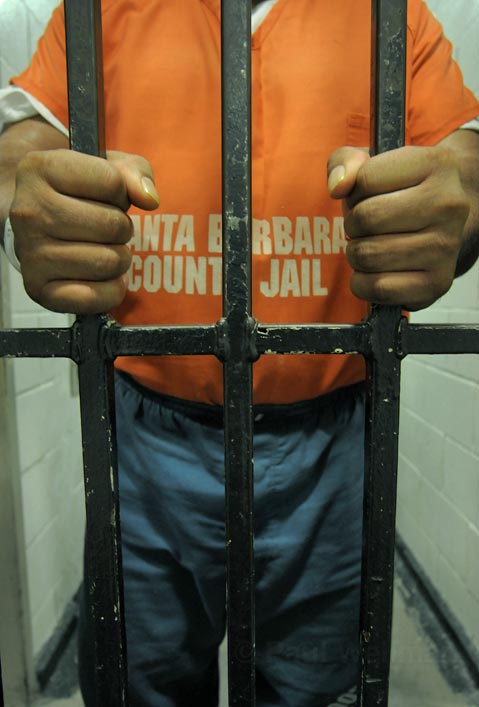Make the Jail Humane
Fix the Mental Health Neglect in the Santa Barbara County Jail

John Paul Thomas (“JT”), an acutely mentally ill man from Santa Maria, died just 20 minutes after being admitted to Santa Barbara County’s Main Jail in January 2022. The Sheriff-Coroner declared JT’s death “accidental,” but our county’s 2022-2023 Grand Jury found that JT’s death would be considered a homicide in virtually all modern and independent medical examiners’ offices. Their report, based on a thorough, independent investigation, that included consultation with two board-certified medical specialists, recommended JT’s death be investigated as a homicide by California’s Attorney General.
The death of JT was one of eight in our county jails from 2022 to October 2023, a number that raises serious questions regarding mental-health care and humane treatment of jail residents, as well as increasing an exposure to lawsuits. Already, the sheriff and the county are under court orders to improve jail conditions. If they don’t, the county could face sizable financial penalties for a failure to comply with the federal court orders in the Murray v. Santa Barbara County and Sheriff’s Office case.
Bill Brown, who serves dual elected roles as Sheriff and Coroner, rejected the Grand Jury’s call for an independent homicide investigation, asserting this “will not be implemented.” (See the Independent‘s “S.B. Sheriff ‘Wholly Disagrees’ with Grand Jury Report on Jail Death.”) However, an independent investigation into JT’s death seems completely appropriate, since a potential conflict of interest exists when the Sheriff-Coroner is the sole agency investigating a death in a county jail that the sheriff operates.
JT’s controversial death, and the sheriff’s resistance to further investigation, highlights a much bigger problem that affects public safety in our community as well as humane health care for jail residents: How mentally ill people are treated (actually not treated) in our county’s jails. For example, no medical interventions are available for acute mental health crises from 11 p.m. to 7 a.m., the time frame when JT died.
The county has engaged Wellpath, a private contractor, to meet the health-care needs of jail residents. The sheriff is responsible to oversee Wellpath’s health care and required to annually report findings. Wellpath has issued no report for over a year, and the sheriff has not exercised appropriate oversight to ensure adequate health care in the jail. The public, taxpayers, and jail residents deserve better than this.
Currently, data available to the office of the County Executive Officer documents an estimated 125 acutely mentally ill jail residents on any given day. Inadequate mental-health care in the jail worsens their conditions and public safety. Inadequate mental-health care and a lack of oversight to ensure it, results in mentally ill jail residents returning to our communities in unstable condition with high recidivism rates.
On August 14, 2023, a federal District Court in Murray v. County of Santa Barbara found the county and the sheriff have failed to comply with standing orders of the court — issued over three years ago — requiring that corrections be made to inhumane, substandard conditions in our county’s jails. The sheriff and county are ordered to comply with the 2020 Remedial Plan, [II.A at pp. 3,4]:
(1) The County shall appoint a County employee or consultant with adequate expertise to provide ongoing monitoring and oversight of the private Jail health care provider contract.
(2) The County’s Department of Public Health and Behavioral Wellness shall actively monitor the Jail health care contract with any private health care services provider (emphasis added).
The court designates County Public Health to provide transparency and assurance where the sheriff’s oversight has failed. Earlier this month, court-appointed mental-health expert Timothy Belavich, PhD, submitted a Status Report rating performance for 84 separate provisions of the Remedial Plan. The Sheriff’s Office failed to “substantially comply” with 87 percent of agreed-upon provisions, including only partial compliance with 59 and noncompliance with 14. Two areas related to suicide prevention declined from Substantial to only Partial Compliance.
Sheriff Brown’s failures to exercise meaningful oversight and timely correct widespread health-care inadequacies at the jail expose county taxpayers to risks of court-imposed fines that could run to millions of dollars. Meanwhile, public safety is compromised by failing to provide jail residents with needed mental-health care.
Our county supervisors called for Wellpath’s long overdue Annual Report to be presented in October. No report has been forthcoming, either from Wellpath or the sheriff. This critical agenda item is now pushed into November, when we will join others in asking our supervisors to meet the federal court’s Murray mandate: Appoint the county departments of Public Health and Behavioral Wellness to provide active monitoring and oversight of the Wellpath contract, with transparent, timely reporting and improved care.
Lastly, the Board of Supervisors is required to respond to the Grand Jury report. We urge them to call for an independent evaluation of JT’s death by the California Attorney General.
Laurence Severance, Gail Osherenko, Maureen Earls, Peter Brown, write on behalf of the joint Criminal Justice Reform Working Group of the League of Women Voters of Santa Barbara (LWVSB) and Clergy & Laity United for Economic Justice of Santa Barbara (CLUE).




You must be logged in to post a comment.